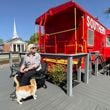On Aug. 2, 1992, U.S. Olympian Joe Jacobi was up before the sun could rise.
Along with teammate Scott Strausbaugh, Jacobi was awake at 4:45 a.m. developing a strategy for his first Olympic competition in the Slalom Doubles Canoe race.
The duo spent close to six hours getting prepared for the race. They came up with solutions that included deciding to navigate slowly through high waves and attacking quickly when the waves were low.
So when they got to the course at 10:17 a.m., they weren’t thinking about their competition. They had their sights set on winning.
“We were just trying to do the very best that we can do,” Jacobi said. “It was about what we could do on the day. We couldn’t control the French, the Czechs, the Germans, the Swiss or all these other double-canoe teams we were racing against.”
Their hard work paid off as they became the first U.S. Olympians to win a gold medal in whitewater slalom. The victory still stands as the only gold medal the United States has won in the Olympic whitewater canoeing event.
Now 24 years later, Jacobi still gets excited when he thinks of that day.
“I don’t think it is a fixed moment in time as I still think about it,” Jacobi said. “My feelings change as I change. It still feels like a process to me of putting it in context.”
In that time, Jacobi has gone on to be a 10-time U.S. National Champion and six-time World Cup medalist in the double and single canoe.
However, he hasn’t always hung on to his 1992 Olympic gold medal. In June, the medal was stolen from his car by thieves, as he was eating at an restaurant in Atlanta.
“The thieves went through our back window and got my computer bag out,” he said. “I was never angry or upset about what happened.”
The medal was eventually found by a 6-year-old girl and given back to him. The story made national headlines last month, and Jacobi has honored the family in with a reward and an invitation to his events.
Now with his medal back, Jacobi has made an effort to speak at several events about the incident and gotten people to join his cause. He now works with the Nantahala Outdoor Center (NOC) to help younger children get involved with kayaking.
He also recently hosted “Paddle With an Olympian” at the NOC Powers Island location in Sandy Springs to encourage people to get out on the water.
“I just want to share the outdoors and have people and kids understand what is in their backyard,” Jacobi said. “I just want them to be open to try something new and different.”
The NOC appreciates his support for kayaking and has seen a growth in the number of people signing up for the sport.
They hope that Jacobi will continue impacting the youth and help younger athletes such as Michal Smolen, who is the 23rd U.S. Olympian to come through the NOC, grow further in the kayaking.
“Having Joe show the progression of someone starting in Atlanta and end up winning the gold medal is huge for us,” NOC outpost operations general manager Steven Foy said. “It helps everyone around us have the same focus and having the Olympians set that pace for us is great.”
Jacobi said his future plans is to continue to help where he is needed by carrying on the legacy of his Olympic victory.
“When people touch and hold the medal, they won’t remember me but the sport of kayaking,” he said. “I’m reminded that the Olympic values mean something and has taken to the people. It changes the way they see the community and themselves.”
About the Author





